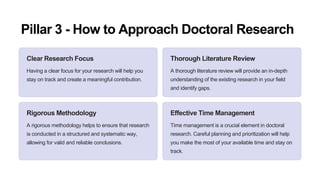The-Three-Pillars-of-Doctoral-Research-What-Why-and-How
- 1. The Three Pillars of Doctoral Research: What, Why, and How Welcome to this presentation on the three essential pillars of doctoral research. As a doctoral researcher, you are taking on the responsibility of advancing knowledge in your field, addressing gaps in literature, and contributing to the betterment of society. In this presentation, we will explore the key aspects of doctoral research, including what it is, why it is important, and how to approach it effectively. KP by Krishan K Pandey (PhD) Dean Office of Doctoral Studies, O.P.Jindal Global University, Sonipat Haryana www.krishanpandey.com
- 2. Introduction The importance of doctoral research cannot be overstated. In this presentation, we will examine the three essential pillars of doctoral research that form the basis for high-quality, impactful research. By understanding these pillars, you can enhance your research skills and make a meaningful contribution to your field.
- 3. Pillar 1 - What is Doctoral Research? Doctoral research is an advanced level of study that requires a significant amount of time and effort. It involves original contributions to knowledge in a particular field, while also developing your own expertise. A PhD or other doctoral degree is often awarded upon successful completion of the research program.
- 4. Pillar 1 - The What: Key Elements Research Question Doctoral research begins with a well-defined research question that forms the basis of the study. Literature Review A comprehensive literature review is essential for doctoral research, as it provides the researcher with an understanding of the existing body of research. Methodology The methodology is the framework for the research, outlining the methods and techniques that will be used to conduct the study. Data Collection Data collection involves gathering information through various methods such as surveys, interviews, or experiments, depending on the research question and methodology. Analysis The data is analyzed to derive insights and conclusions regarding the research question. Conclusion The conclusions are based on the analysis of data and should relate back to the research question.
- 5. Pillar 2 - Why is Doctoral Research Important? Doctoral research is an important aspect of academic pursuits that has a substantial impact not just in academia but also on society. The research contributes to the advancement of knowledge, addresses gaps in literature, fosters critical thinking, and most importantly, has a lasting impact.
- 6. Pillar 2 - The Why: Benefits Personal Growth Doctoral research is a transformative process that helps you develop essential skills such as problem-solving, critical thinking, and communication. Career Opportunities Doctoral research positions you as an expert in your field and can lead to exciting career opportunities.
- 7. Pillar 3 - How to Approach Doctoral Research Clear Research Focus Having a clear focus for your research will help you stay on track and create a meaningful contribution. Thorough Literature Review A thorough literature review will provide an in-depth understanding of the existing research in your field and identify gaps. Rigorous Methodology A rigorous methodology helps to ensure that research is conducted in a structured and systematic way, allowing for valid and reliable conclusions. Effective Time Management Time management is a crucial element in doctoral research. Careful planning and prioritization will help you make the most of your available time and stay on track.
- 8. Pillar 3 - The How: Research Process 1 Selecting Research Area A research area should be chosen based on your interests and opportunities for impact. 2 Formulating Research Question A well-defined research question is the foundation for your study and should be specific, relevant, and achievable. 3 Conducting Literature Review An extensive literature review helps to identify gaps and opportunities for original contributions. 4 Designing Methodology A well-designed methodology will help you conduct your study in a rigorous and systematic way. 5 Data Collection The collection of data is essential to generate insights and meaningful conclusions that address your research question. Data Analysis
- 9. Challenges and Considerations 1 Time Constraints Doctoral research requires a significant investment of time and often has a long timeframe for completion. 2 Research Limitations Researchers must be aware of potential limitations in their research and factor them into the study findings. 3 Data Collection Issues Data collection can be challenging, and researchers must use a range of tools and techniques to gather reliable and valid data. 4 Balancing Other Commitments Doctoral research can be demanding and can make it challenging to balance other commitments like work and family.
- 10. Conclusion In conclusion, doctoral research is a demanding but rewarding experience that requires dedication, hard work, and a commitment to advancing knowledge in your field. By understanding the three pillars of doctoral research - what, why, and how - you can embark on a meaningful and impactful research endeavor that contributes to academic and societal contexts. We encourage you to explore the possibilities and opportunities that await you as a doctoral researcher.










